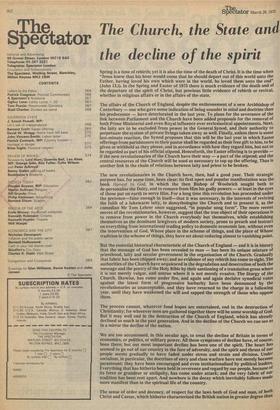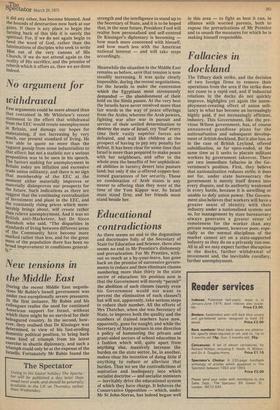The The Church, the State and
the decline of the spirit
Spring is a time of rebirth; yet it is also the time of the death of Christ. It is the time when "Jesus knew that his hour would come that he should depart out of this world unto the Father, having loved his own which were in the world, he loved them unto the end" (John 13.i). In the Spring and Easter of 1975 there is much evidence of the death and of the departure of the spirit of Christ, but precious little evidence of rebirth or revival, whether in religious affairs or in the affairs of the state.
The affairs of the Church of England, despite the enthronement of a new Archbishop of Canterbury — one who gave some indication of being sounder in mind and doctrine than his predecessor — have deteriorated in the last year. To plans for the severance of the link between Parliament and the Church have been added proposals for the removal of both Prime Ministerial and even Royal influence over ecclesiastical appointments. Next, the laity are to be excluded from power in the General Synod, and their authority to perpetuate the system of private livings taken away as well. Finally, unless there is some last-minute reaction, the Synod proposes that this will be the last year in which Easter offerings from parishioners to their pastor shall be regarded as their free gift to him, to be given or withheld as they please, and in accordance with how they regard him, but not to be regarded as part of his official stipend. Henceforth, the Easter offering is to provide — if the new revolutionaries of the Church have their way — a part of the stipend; and the central resources of the Church will be used as necessary to top up the offering. Thus is another link in the chain of relations between laity and priest to be broken.
The new revolutionaries in the Church have, then, had a good year. Their strategic purpose has, for some time, been clear: its first open and popular manifestation was the book Honest to God, in which the then Bishop of Woolwich sought both to de-personalise the Deity, and to remove from Him his godly powers — at least in the eyes of those put on earth to serve Him. For a long time this revolution has proceeded under the pretence—false enough in itself—that it was necessary, in the interests of reviving the faith of a lukewarm laity, to demythologise the Church and to present it, as the comedian Mr Tom Lehrer once suggested, "in popular song form". The more recent moves of the revolutionaries, however, suggest that the true object of their operations is to remove from power in the Church everybody but themselves, while establishing themselves as the dominant lawgivers of modern society, prone to preach and instruct on everything from international trading policy to domestic economic law, without even the intervention of God, Whose place in the scheme of things, and the place of Whose tradition in the scheme of things, they have set about reducing almost to vanishing point.
But the essential historical characteristic of the Church of England — and it is in history that the message of God has been revealed to man — has been its unique mixture of priesthood, laity and secular government in the organisation of the Church. Gradually that fabric has been chipped away; and no evidence of any rebirth has come to sight. The authorities of the Church have acquiesced in the degradation and desecration of both the message and the poetry of the Holy Bible by their santioning of a translation gross where it is not merely vulgar, and untrue where it is not merely evasive. The liturgy of the Church, likewise, has come under fire, and again and again decisive synodical votes against the latest form of progressive barbarity have been denounced by the revolutionaries as unacceptable, and they have returned to the charge in a following year, until they have weakened the will and sapped the strength of those who oppose them.
The process cannot, whatever fond hopes are entertained, end in the destruction of Christianity; for wherever men are gathered together there will be some worship of God. But it may well end in the destruction of the Church of England, which has already declined so much in the past generation. And in the decline of the Church we can see as in a mirror the decline of the nation.
We are too accustomed, in this secular age, to treat the decline of Britain in terms of economics, or politics, or military power. All these symptoms of decline have, of course, been there; but our most important decline has been one of the spirit. The heart has seemed to go out of our country in the face of adversity, and the spirit and thrust of our people seems gradually to have faded under stress and strain and division. Under socialism, in particular, the doctrines of envy and class warfare have not merely become paramount; they have been encouraged and even institutionalised by political leaders. Everything that has hitherto been held in reverence and regard by our people, because of its force or grandeur or antiquity, has come under attack; and the very fabric of our tradition has been rent apart. And nowhere is the decay which inevitably follows made more manifest than in the spiritual life of the country.
The sense of order and decency, of respect for the laws both of God and man, of both Christ and Caesar, which hitherto characterised the British nation in greater degree than it did any other, has become blunted. And the hounds of destruction now bark at our gates. If there is any place to begin the turning back of this tide it is surely the Spiritual. For, if we do not again begin to heed the word of God, rather than the fulminations of disciples who seek to write Him out of the very canons of His Church, if we do not attend again to the reality of His sacrifice, and the promise of rebirth which it offers us, then we are done indeed.



































 Previous page
Previous page